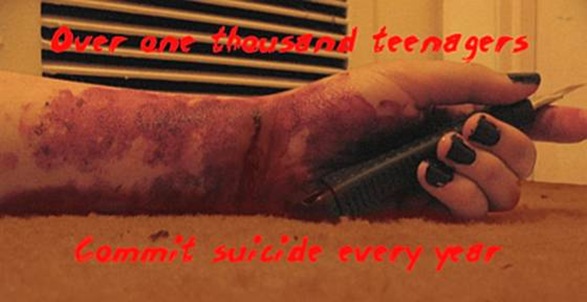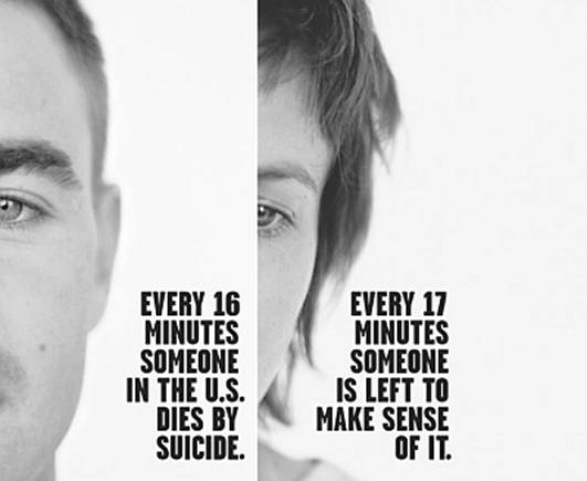
Someone very close to us lost her son to teen suicide. Her son was 18 years old, a great kid who took his dad’s gun one day, sat in his parents’ car in a park and shot himself to death.
He is gone and is probably not suffering anymore, but a whole family he left behind is still picking up the pieces of their shattered life and cannot find comfort.
I am writing to you because I pray you never have to be in the same position.
Burying your own child is the most painful thing for every parent. I once went behind a small coffin and the scar never healed.
Suicide among teens (15-24 years old) is a big problem around the world. In Australia alone, more than 400 young people kill themselves every year! 400 families and thousands of people are left behind, asking themselves over and over again
What could I have done to prevent it?
The teen years are tough, mainly because the shift from being a kid to being an independent adult is complicated and hard. Too many expectations at school or at home create lots of confusion and stress.
When I was gathering information for my book Be Special, Be yourself for Teenagers, I found out that from teens’ point of view, parents are the biggest stressors in their life. The strongest feelings teens have are that they are alone, helpless and unable to find a way out of their situation.

Teens at risk of committing suicide
Although it is hard to pin point the reasons for teen suicide, it seems that living is more painful for suicidal teens than dying. After they have committed suicide, it is too late to help them, but we can (and should) identify teens at risk and give them the tools to find hope.
Here are the types of teens who are at a higher risk of committing suicide:
- Teens who have already made a suicide attempt.
- Teens having relationship problems with family and friends – these relationships are very demanding for teens and the difficulties may seem unbearable to them.
- Depressed teens – although everyone feels depressed from time to time, feeling down for more than 3 months is a sign that something is wrong. If a teen you know is showing any of the following signs, he/she may need help:
- Lost interest in daily activities
- Stopped enjoying things he/she used to enjoy
- Expresses negative thoughts about himself/herself
- Shows a sudden change in weight or in sleeping pattern
- Teens with significant mood swings – some mood swings are normal and related to hormonal changes, but stay tuned and if you feel they are too big, seek help.
- Teens who drink alcohol – if you think your teen is overusing alcohol, if it clutters his/her decision making and makes him/her do risky things, get them help! Also, alcohol is a depressant (see above).
- Teens who take drugs – learn about the symptoms of drug use to allow you to find out if your teen is using them and get them help if they do. Some drugs are depressants and some have a depressing after effect (see above). Being on and off drugs can cause severe mood swings (see above).
- Teens from dysfunctional families – although this is not a 100% accurate, teens who are exposed to the following things are more at risk of committing suicide than others:
- Domestic violence
- Abusive relationships in the family
- Overprotective or extremely restrictive parents
- Teen with mental illnesses, such as Schizophrenia.
- Teens who fail at school.
- Teens living in an environment of chronic unemployment and lack of direction and purpose.
- Teens who are confused about their sexuality – they find themselves alone and unable to express their thoughts and feelings more than other teens. Many times, they are also teased and even abused for being different.
- Sexually abused teens.
- Grieving teens – the loss of someone close during the teen years can become far more significant than any other time. This is especially true when the person lost was the teen’s role model in life.
- Traumatized teens – teens who have experienced war, persecution or any other forms of trauma may feel helpless and weak and are at a higher risk of committing suicide.
Helping teens to choose life
 I am sure many teens go through tough times (I have written about some of them), but most of them find ways to fight the thought of suicide if they have the right person to help them out of “the dark place”. Parents, teachers, close family member and friends can be a flashlight to light the darkness.
I am sure many teens go through tough times (I have written about some of them), but most of them find ways to fight the thought of suicide if they have the right person to help them out of “the dark place”. Parents, teachers, close family member and friends can be a flashlight to light the darkness.
In this blog, you can find hundreds of ideas and practical tips to make sure your teens will not go down the suicide path, a path they cannot return from. But you do not need hundreds of tips. Here are 10 guidelines that will give you tremendous power as a parent in helping your teens to choose life:
- Focus on building self esteem. Kids with high self esteem are likely to overcome difficulties in life and pass through their teen years in the most fun and enjoyable way.
- Teach teens from as early as 2-3 years old to cope with problems not by presenting problems to them but by being with them and escorting them as they solve their problems. Every time they have a problem, tell them “You are so good at solving problems” to minimize the feeling of helplessness and develop their belief in their own resourcefulness.
- Work on your kids’ communication with you from as early as 4 or 5 years old. Encourage your kids to tell you everything. Even if it is something you hate to hear, say “I appreciate your honesty” and “I’m happy you’ve told me”. As long as you still have good communication with your teen, you are likely to know when something goes wrong.
- Guide your teen without using any force. Many teens are afraid of their parents’ reactions to things they have done and this makes them do silly things to avoid this reaction. See yourself as a guide not a judge. Many teens think their parents do not listen to them, so always listen to what your teen has to say before commenting on it.
- Create a supportive family atmosphere, where everyone helps one another, cares for one another and backs one another up. This will give your teens the feeling they are not alone and they can always ask for help, because a brother, a sister, Mom or Dad will be there to help.

- Spend quality time with your teens beyond family gatherings. From time to time, take a day off and spend it with them, if you have to. The more good time your teens spend with you, the less likely they are to have problems and the more likely you are to notice when something is wrong.
- Be involved in your teens’ life. The more you know about their friends, their pressures, their school work, their hobbies and their work, the more you can notice when something is out of order. Discuss with your teens what privacy means and try to get involved without invading their privacy.
- Try to support your teens when they face difficult situations, like exams, trouble with friends, romantic breakups, encounters with the police or finding and keeping employment. Always be empathetic to their problems. Do not say “It’s nothing” or “No big deal”. For them, it is a big deal and you need to respect that. Listen, ask how you can help and do the best from there.
- Give your teens stability. Make sure you are around. Be a role model for good relationships. Have a stable income. Have a reasonable routine in life and avoid too many changes when teens go through tough times.
- If your family is going through tough times, like separation, divorce or grief, it is a stressful time for you too and your ability to help your teen may be limited. Seek external (professional) help for your teen (and yourself).
May we all have happy, healthy and successful teens. Amen!
Happy parenting!
Ronit
Prevent Teen Suicide |
 |












